When tax season rolls around, the question hits hard:
Do I need a CPA… or will a regular tax preparer do?
It's not just a budgeting decision. Picking the right tax professional can mean the difference between:
In 2025, with more people freelancing, running side businesses, or dealing with state-specific tax rules, the stakes are higher than ever. And yet, confusion persists, especially between two terms often used interchangeably: CPA and tax preparer.
Here's the truth: Not all tax preparers are CPAs, and not all CPAs are the right fit for your needs.
This guide will break down the key differences, help you understand when each makes sense, and walk you through how to choose the right one based on your situation.
Whether you're a salaried employee, a freelancer, or a small business owner, we'll help you make a confident, informed choice.
Let's get into it.
A Certified Public Accountant (CPA) is a licensed accounting professional who meets strict educational, ethical, and regulatory requirements. Unlike general tax preparers, CPAs are certified by their state's board of accountancy and are held to higher standards in both competence and accountability.
In simple terms, a CPA isn't just someone who files your tax return; they're trained to understand the full scope of your finances, help you make strategic decisions, and even represent you before the Internal Revenue Service. Whether you're an individual with a complex tax situation or a small business looking to grow, a CPA can provide far more than seasonal tax prep.
To become a CPA, professionals must complete all of the following:
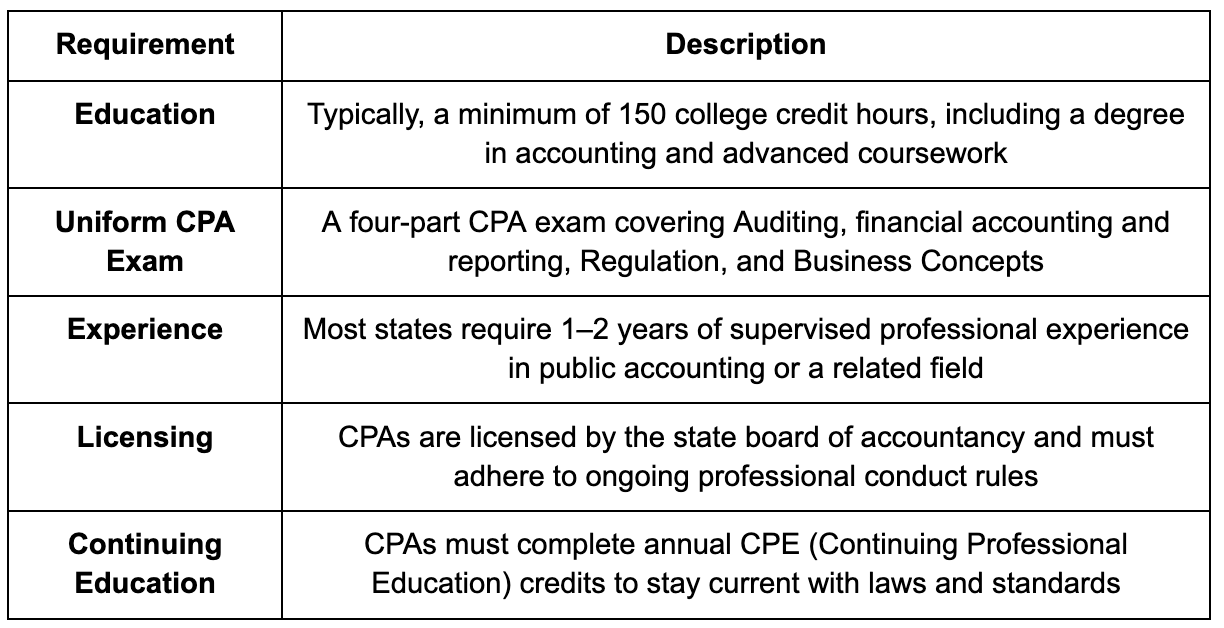
This rigorous path ensures that CPAs have deep knowledge not only in tax code but also in auditing, financial reporting, business operations, and ethics. The American Institute of Certified Public Accountants oversees the standards and professional expertise requirements for the CPA credential.
CPAs are authorized to do much more than just fill out tax forms. Their services often include:
In short, a licensed CPA offers full-spectrum financial guidance, not just tax filing.
While many taxpayers can get by with a tax preparer or software, there are several situations where hiring a CPA is a smart, or even essential, move:
You Should Consider a CPA If:
A tax preparer is anyone who helps individuals or businesses prepare taxes and file tax returns. Unlike CPAs, tax preparers don't need a license or advanced accounting education to do their job, although many do pursue certifications to demonstrate credibility.
Tax preparers range from part-time seasonal workers at national chains like H&R Block or Jackson Hewitt, to full-time professionals who assist clients year-round. They may or may not have formal credentials, and the quality of service can vary widely depending on their experience and training.
Here's a quick breakdown of the most common types of tax preparers:
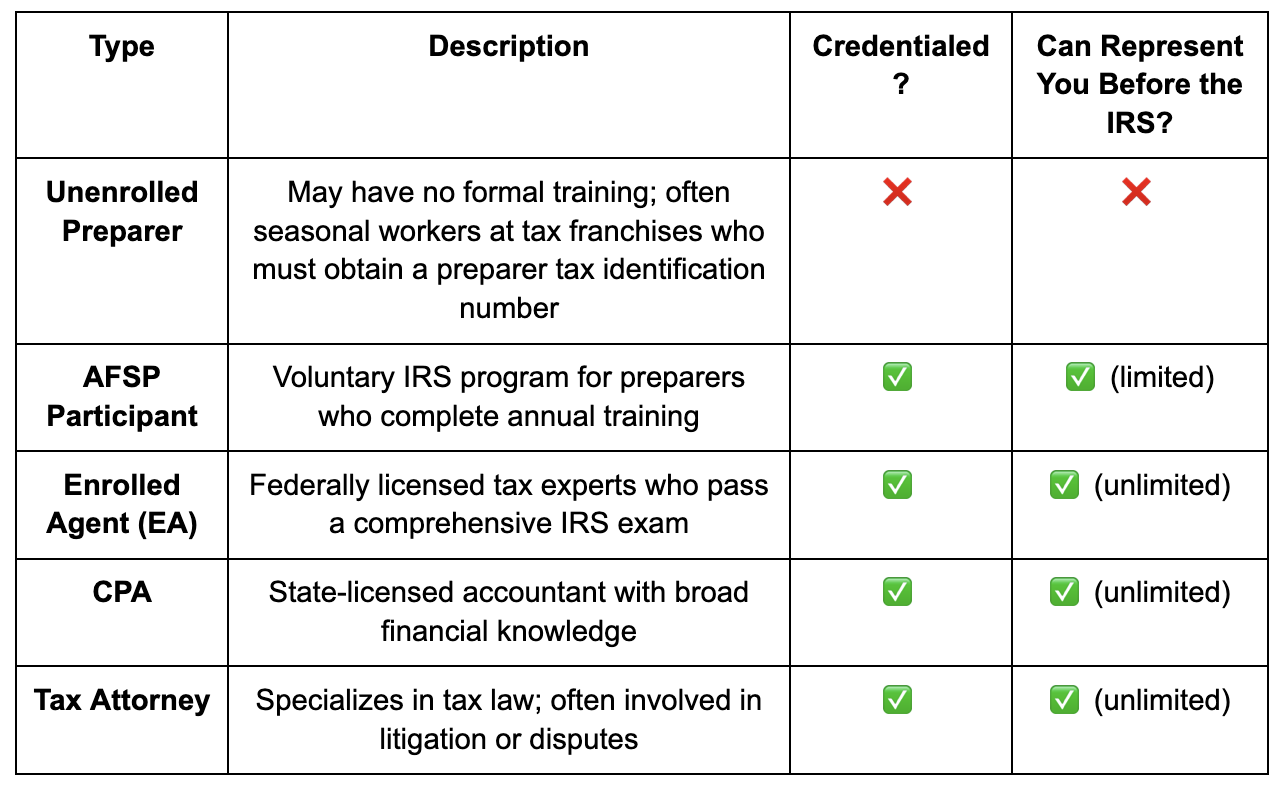
💡 Note: Only CPAs, EAs, and attorneys have unlimited representation rights before the IRS. You can find qualified professionals in the directory of federal tax return preparers maintained by the IRS.
The core job of a tax return preparer is to complete and file your return, but the depth of service depends on their background. Basic services typically include:
Some preparers may also offer:
For many taxpayers with a straightforward tax situation, a tax preparer is more than enough, and often far more affordable than hiring a CPA. Here's when they might be the right fit:
A Tax Preparer Might Be Right If:
The process to become a tax preparer is relatively straightforward:
Anyone can become a tax preparer with minimal barriers to entry, which is why the quality and expertise can vary significantly.
The path to become a CPA is much more rigorous:
CPA candidates must demonstrate significant commitment and expertise before earning their professional credential.
When tax season hits, many people ask: "Should I hire a tax preparer or a CPA?" While both can help you file your taxes, the difference between a CPA and a tax preparer lies in expertise, services offered, and the level of protection you have if something goes wrong.
Here's what's the difference in a clear breakdown:
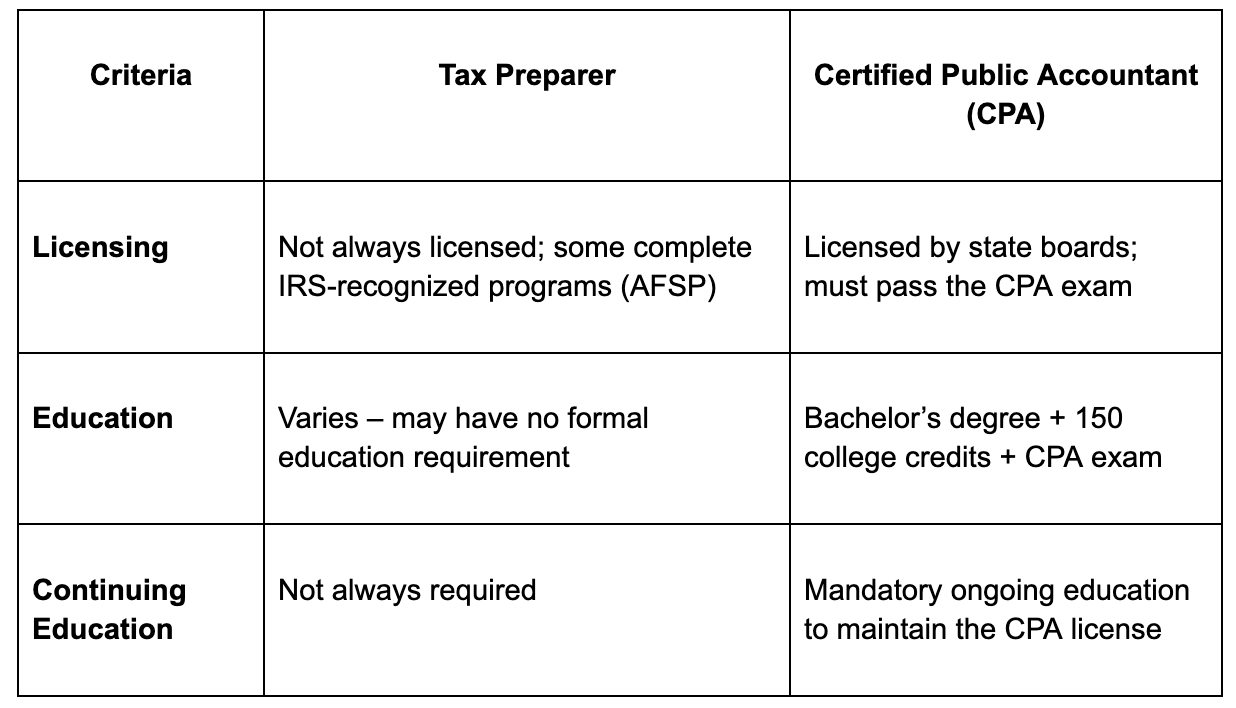
What this means for you: Tax preparers may be fine for basic returns, but CPAs bring verified qualifications, especially critical if your finances are complex or you run a business.
2. Scope of Services
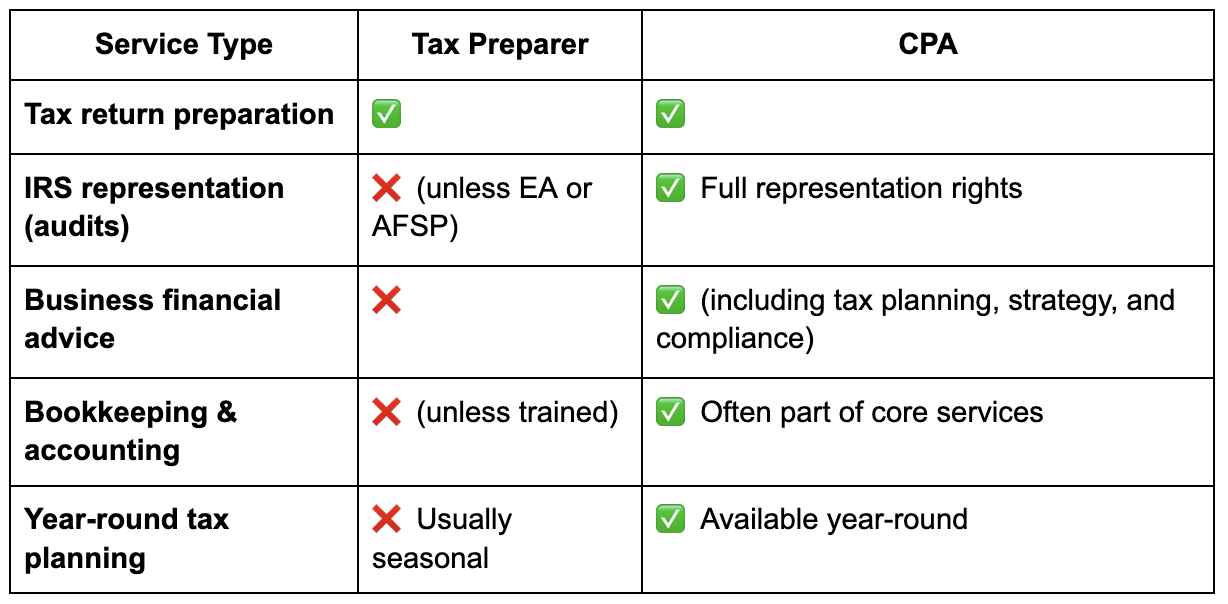
CPAs go far beyond filing; they help with audits, tax minimization, payroll, bookkeeping, and long-term planning. That's why many small business owners rely on them as outsourced CFOs or long-term financial advisors.
If there's ever a problem with your taxes, a CPA can legally stand between you and the IRS.
4. Cost and Engagement Style
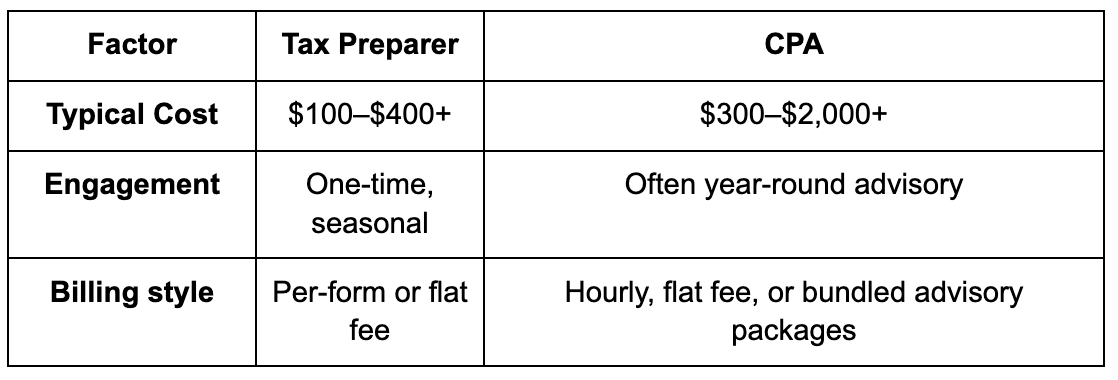
Key insight: If all you need is a simple 1040 filed correctly, a tax preparer or even software may be enough. But if you own a business, earn 1099 income, have multiple income streams, or want a proactive tax strategy, a CPA is a smart investment, not an expense.
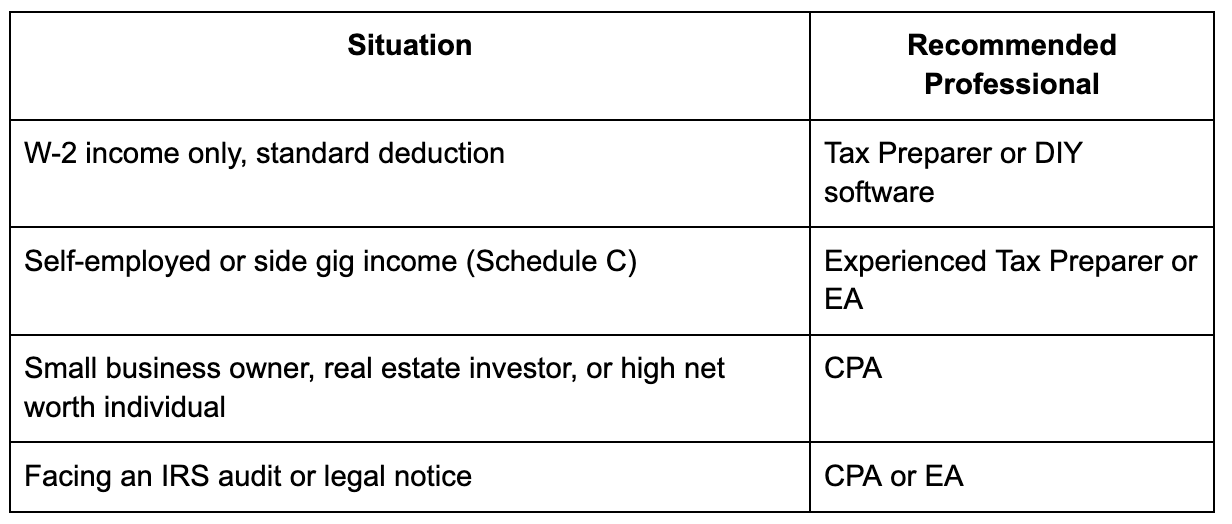
The IRS emphasizes the importance of choosing a qualified tax professional. Their official guide reminds taxpayers that only CPAs, EAs, and attorneys have unlimited representation rights, a key consideration if things get complicated.
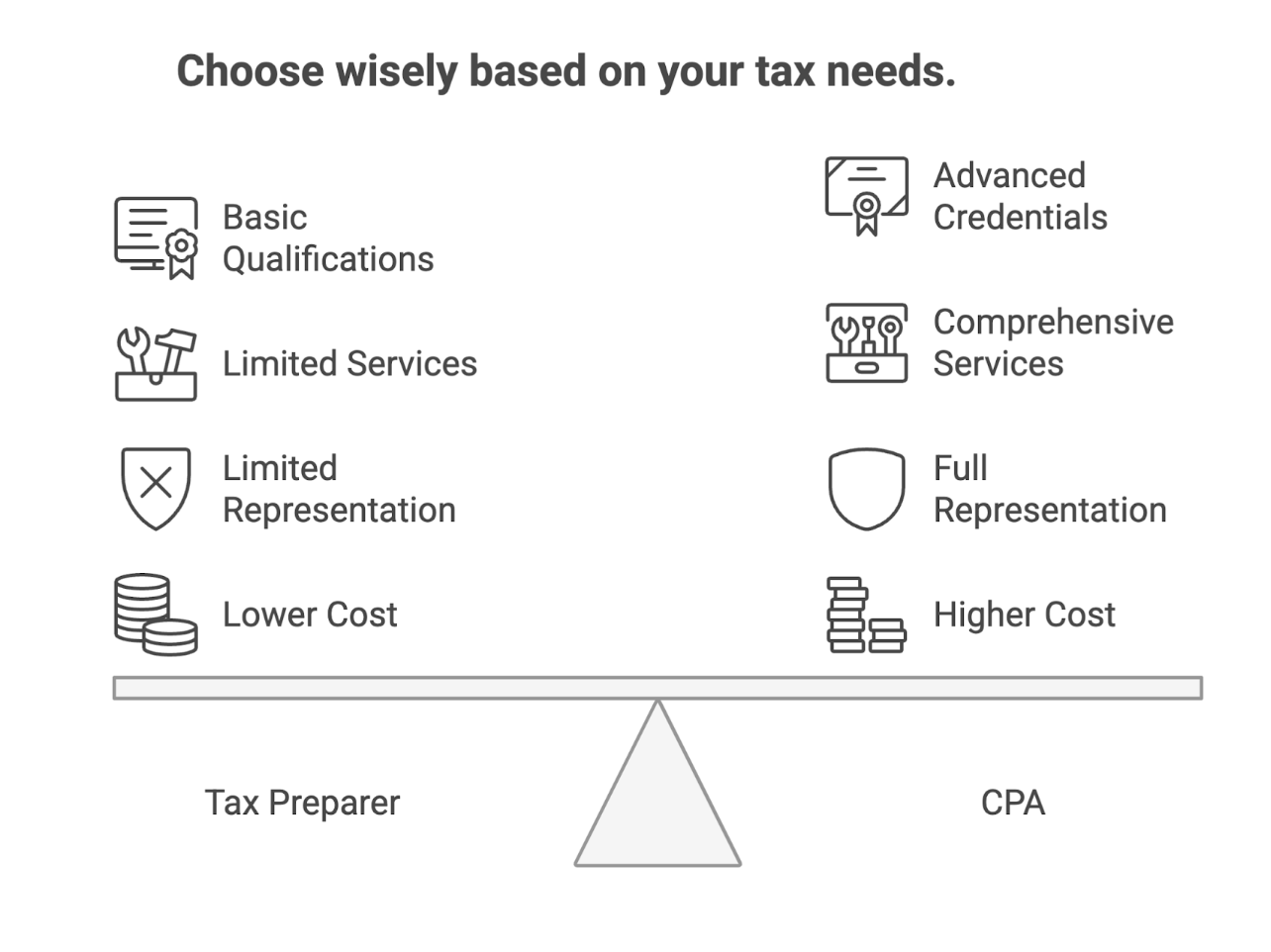
When comparing a CPA versus tax preparer, it's important to understand that CPAs offer services outside of tax preparation. A CPA tax preparer brings additional professional expertise that extends throughout the year.
Areas where CPAs excel:
You likely need a CPA if:
A tax advisor with CPA credentials can provide tax preparation services while also offering strategic guidance that a basic tax preparer cannot.
Tax preparers who provide tax preparation services focus primarily on:
The tax preparer's strength lies in efficiently handling routine tax returns for individuals with uncomplicated tax situations.
While tax preparers focus mainly on filing returns, CPAs are licensed professionals who provide a wide range of financial services that extend far beyond tax season. If you're only looking for someone to fill out forms, a tax preparer can get the job done. But if your finances are layered, evolving, or you run a business, a CPA can offer strategic value throughout the year.
Here's a detailed breakdown of what CPAs can do and where they go beyond the role of a tax preparer:
CPAs don't just show up in March; they work with clients all year to:
Tax preparers typically help after the fact. CPAs help before the tax bill lands.
CPAs often act as financial consultants for business owners. Their services include:
They can also help you compare your current tax burden to what it would look like under another structure, something a basic preparer may not be trained to do.
One of the biggest differentiators: CPAs can represent you before the IRS for audits, payment disputes, or collection issues.
Tax preparers who are not EAs or CPAs have limited or no rights to represent you if the IRS questions your return. CPAs can:
CPAs are often hired by high-net-worth individuals for:
Most tax preparers are not trained or licensed to advise on these advanced financial matters.
If you're applying for a loan, raising capital, or facing legal compliance requirements, you may need audited or reviewed financial statements. CPAs are authorized to:
These services are essential for larger businesses or startups looking to scale, and tax preparers simply don't provide them.
At the end of the day, whether you go with a tax preparer or a CPA comes down to the complexity of your finances and what kind of support you need.
If you're filing a simple return and just want to stay compliant, a tax preparer may be enough. But if you're running a business, navigating multiple income streams, or thinking long-term about tax strategy, working with a CPA gives you deeper insight, audit protection, and year-round advisory power.
The important thing? Don't just think about tax filing—think about tax planning. And make sure the professional you choose is equipped to support the full picture of your financial life.
Understanding the difference between a CPA and a tax preparer helps you make the right choice for your specific needs. Whether you choose a tax accountant with CPA credentials or a basic tax service provider, ensure they have the expertise to handle your unique situation.
At Madras Accountancy, we combine U.S.-level expertise with offshore efficiency to deliver full-service support, from tax prep and bookkeeping to CFO services and compliance.
Whether you're a startup, CPA firm, or growing business, we help you scale with clean books, smart planning, and zero surprises.
👉 Talk to us to see how we can support your goals and simplify your finances.

A practical comparison of hiring a freelancer vs using a dedicated offshore accounting team, focusing on continuity, quality control, security, and scaling.

How CPA firms outsource payroll and 1099 work to reduce penalties and admin load, with a clean workflow for approvals, filings, and year-end reporting.

Practical do's and don'ts for CPA firms outsourcing accounting work, based on common failure points and what successful rollouts do differently.